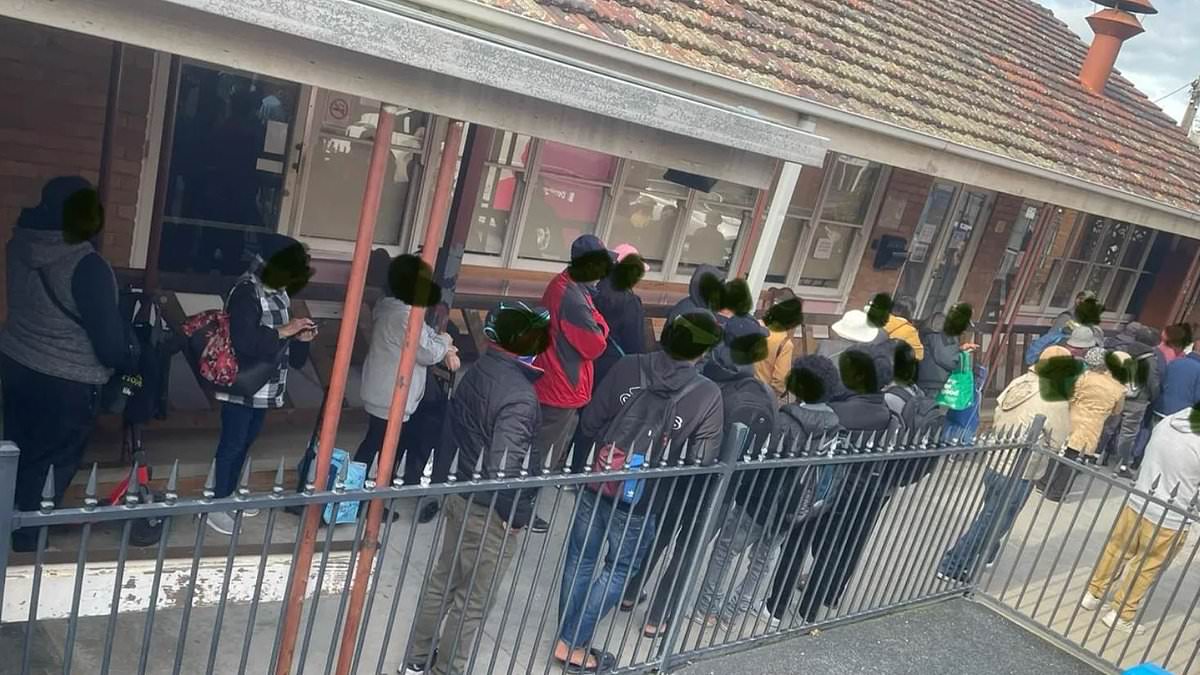Shocking photos show dozens of people lining up at food banks across , with many who once donated now seeking help themselves as the cost-of-living crisis worsens.
The photos have emerged as a Foodbank report reveals that nearly one in three n households are facing food insecurity.
Of these, two million people face ‘severe’ food insecurity where families frequently skip meals or sometimes endure entire days without food.
‘The current cost of living has severely impacted me as a single mother who works full time but does not receive any child support from my former partner,’ one single mother who was surveyed wrote.
‘One income only is no longer affordable since COVID for a single-parent family to live off with the increased fuel, energy, insurance, rent, food and daily cost of living expenses. I often go without food and necessities to make sure my children don’t.’
With mortgage interest rates staying high and rents continuing to rise, 21 per cent of households earning over $95,000 annually are experiencing food insecurity.
‘We’re getting more and more people who haven’t reached out before, people that might have two incomes but have higher [expenses],’ Ballarat Foodbank manager Katrina Gibbs told the ABC.
‘It’s clear the cost-of-living crisis is exacerbating the challenges facing those in vulnerable circumstances, and forcing people to make compromises on what, and when they are eating.’
Meanwhile, the number of people at risk of homelessness increased by 63 per cent to three million people, with many frontline services unable to meet demand, a separate report by Homelessness found.
The figures were alarming and the federal government needs to increase services for the sector and boost housing, Homelessness Kate Colvin said.
‘Pressure at homelessness services is so intense. There are so many people being squeezed out of rental markets and services do not have the resources to respond,’ she said.
‘The critical thing to protect people from homelessness and escape from it is really the amount of social housing.’
The report found families with children seeking emergency accommodation couldn’t be provided with help about one in every five days, while people without kids were turned away every one in two days.
Unaccompanied minors were turned away one in every nine days.
Over a two-week period, there were 200 hours where services had to close their doors, 325 hours of unanswered phone calls and 666 urgent emails staff could not reply to.
‘We have had a massive increase in homelessness support needed at the frontline and workers don’t have the resources they need,’ Ms Colvin said.
‘People are reaching out for support and services can’t answer the phone or they’re having to close their doors.’
Ms Colvin said a lot of people were only one ‘negative shock’ away from homelessness.
‘You have the vulnerability of a person because they have risk factors like a low income, or face discrimination, then the negative shock is the life event that happens like losing a job, experiencing family violence, or you’re discharged from hospital,’ she said.
The homelessness report comes as the Albabese government is looking to get its long-stalled housing policy through parliament in the final sitting fortnight of the year.
Labor has tried to legislate an equity scheme that would allow first homebuyers to put down a smaller deposit.
The government has also tried to put in place a build-to-rent scheme, under which tax incentives would be offered to developers to construct properties to be leased out.
The federal Greens have blocked support for the measures, calling for the government to invest more in social and affordable housing.
Independent MP Helen Haines on Monday also upped calls for greater housing investment in regional areas.
Ms Haines introduced a private member’s bill to parliament that would set baselines for how many housing projects are undertaken outside major cities.
‘The simple and sad fact is that hard work and home ownership have become disconnected in this country, whereas it used to be that anyone with a decent job could buy a home, it’s now your parents’ wealth that often determines your chances of home ownership,’ she said.
‘The housing crisis is experienced differently in the regions.’
